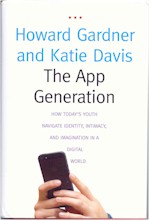 |
|
|
| ||||||
|
|
This page is the original source of this review, though you may also find it on Amazon or other sites. | ||
| Book Reviews Home | Free Audio Books | |
 |
Book Review of: The App GenerationHow Today's Youth Navigate Identity, Intimacy, and Imagination in a Digital World Availability: Usually ships within 24 hours |
| Review of
The App Generation, by Howard Gardner and Katie Davis (Hardcover, 2013) (You can print this review in landscape mode, if you want a hardcopy) Reviewer: Mark Lamendola, author of over 6,000 articles. In a bygone era, parents and teachers provided the lessons and kids responded. With today's app generation, parents and teachers must take an entirely different approach. They are the ones who must respond, because electronic media have completely changed the locus and flow of information. Does this book provide a recipe for what that response should be? No, but it does provide valuable insight into dealing with the app generation. Typically, a book addressing social issues has an agenda. The drawback there, of course, is the book is intended to be a proof of a thesis rather than an open-minded exploration of the issue. The former can easily be a blind leading the blind situation, and that's why an agenda-less book like this one is so valuable. However, the drawback of the agenda-less book is the reader isn't likely to walk away with a "correct answer" sort of conclusion. But if you need such a conclusion, you probably aren't ready to examine social issues because seldom do such simple conclusions reflect the complex reality. Things are more nuanced and layered than such conclusions permit. This book didn't hit us with dire warnings that apps are turning kids into zombies. Nor did it herald a new age, in which app-enabled kids will run circles around their app-avoiding parents. What the authors did was look at how different generations view the mobile app technology. They looked closely at the changes between the generations. It's a complex mosaic, and in that mosaic we find both good and bad effects. They provided some analysis of this also, without going very far down the opinion road. If a reader can sense any personal opinion in this book, it's basically along the lines of "We want to look at both sides." It seems the authors are saying that technology can serve you or you can serve it; user discretion and judgment are the key. I agree with that. Technology itself is actually neutral; it's how we use it that determines good or evil (can you say "atomic energy"?). Apps, like other technology, aren't always used wisely. But some uses are very beneficial. The book seems to bear this out. If the authors were to belatedly slap an agenda onto their finished work, I think they would caution parents to actively engage with their children so that the devices don't become a de facto substitute for parents who are emotionally absent due to their own preoccupations. Another reader might draw a different conclusion, such as the authors might warn parents that a dependency on apps is a real danger. Still another reader might conclude that the authors would say parents should encourage kids to expand their world with the many apps available today. It's not that the book is confusing or its writing unclear; neither is the case. On the contrary, the book is informative and the writing is clear. It's that the subject includes positive and negative aspects, and their relative weights are still in flux. We aren't finding kids drooling in mindless depravity while their IQs plummet to zero, nor are we finding them going to the other extreme, for example suddenly composing great literary masterpieces with their smart phone apps. What we are finding, according the the authors' research, is a change in skills, thinking styles, and other mental attributes. This isn't new to apps. It has happened many times. For example, when calculators became ubiquitous, native math skills decreased but the ability to do more mathematical work rose. Or consider dressage. How many people today know how to properly saddle a horse? This doesn't stop anyone from traveling 500 miles between cities, does it? This mix of effects is pretty much what we are seeing with apps. This book brings us rich detail to help us understand the change, why it is occurring, and what its implications seem to be. The authors do highlight the dangers of dependency, but they also highlight the opportunities of enablement. They provide evidence for both, and avoid hysteria in either direction. The changes are happening, and I think having an informed awareness of these changes is paramount for parents and teachers. Readers of this book will gain that awareness, and not just at the summary level. Understanding specific changes and their implications makes for an actionable learning on the part of the reader. The authors sort the changes into three basic groups: identity, intimacy, and imagination. This seems like a logical grouping, and it certainly helped me stick with the subject matter as the authors went through it. But how do they come up with their information? For example, how do they know how apps affect intimacy? They conducted extensive research. You can find out about it in the book's 10-page methodological appendix. They also tapped many written sources; these sources are provided in the 22-page bibliography. I did a spot check on the sources for quality, and was quite impressed. I often find authors tapping disinformation sources as if they are reliable, and these authors didn't do that. They used really good sources. Including the Introduction, the actual text of this book runs 197 pages. The authors managed to pack quite a bit of insight into those pages. | |
| |||||